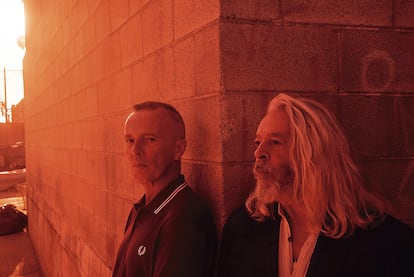Tears For Fears: ‘I hope that the record company that let us go is looking at all these chart positions and saying, fuck!’
One of the greatest bands of 80s pop returns after 17 years of tragedies and depression

Standing in the small kitchen of the London store where they are going to sign copies of their new album, The Tipping Point, it is impossible not to fall in love with these two 60-year-old musicians who once sold 30 million records. Curt Smith and Roland Orzabal, the duo Tears for Fears, have released their first work in 17 years, and it has already soared to the top of the charts. The authors of 1980s synth-pop anthems such as Mad World, Shout and Everybody Wants To Rule The World admit that the new hit has a tinge of vengeance. “To be honest, today I feel slightly vindicated. I’m not proud of this, but I hope that the record company that let us go, the one we had to buy our rights back from, is looking at all these chart positions and saying, fuck!” says Curt. The album has become a number-two bestseller.
Thirty years ago, the album Songs from The Big Chair turned the two friends from Bath into international stars overnight. Their music mixed new wave technopop with lyrics inspired by the American psychotherapist Arthur Janov. The group’s name indicates how much that treatment, seeking to bring to light the repressed pains of childhood traumas, influenced them. “We were recently on a BBC program for Songs from the Big Chair. We were up there with Led Zeppelin, with the Beatles, with Fleetwood Mac,” says Roland. “We knew fundamentally that if this album was going to come out, it would have to be up there with the greatest of our work.”
The duo’s friendship is moving to observe. Their breakup was a tragedy for fans, and they stayed out of the spotlight for years. Recently, they began holding concerts to play their classic songs. Their fanbase has increased in number and in age range, and the pair discovered that they needed to do something new to avoid falling into boredom. “We’ve never wanted to do the same thing twice,” explains Curt. “I’m aware of the fact that we’re not as good as a lot of people. That gives you an incentive to try and be better, you know, so the desire to evolve has always been there. But that’s hard when you are in the public eye. We get comments like, look how old they are. Of course we’re old. That’s why we don’t tell the same stories as when we were kids.”

The album contains references to the Black Lives Matter movement and belligerent criticism of the patriarchy (Break the Man). Above all, though, there are intimate and lacerating confessions by Roland, who through two songs, The Tipping Point and Please Be Happy, which recounts the devastating drift of his first wife Caroline, who fell first into depression and then into alcoholism before her death in 2017. Two years later, he also began to notice that his mental health was suffering. “It’s harder to talk about it than to make music. Music can say things that you can’t in conversation. It’s a beautiful way of communicating. It has been by getting together, and composing, when a more harmonious vision of the suffering that the other was going through has emerged,” he says.
The two men talk and talk. They never tire of explaining their passion for music. They are the first to say they are surprised by the flood of good reviews of their work, and they laugh when they remember the two key moments that made them understand that they no longer had anything to prove. Curt’s was in Vancouver, when he jumped into a karaoke bar one night singing Everybody Wants to Rule the World. None of the customers realized who was on stage. Roland had previous experience as an operatic tenor before launching into pop. He recalls when he decided to try his luck in a reality show called From Popstar to Operastar. He prepared Giordano’s Caro Mio Ben for weeks. But Midge Ure from Ultravox ended up winning. “It really doesn’t matter that no one recognized me when I walked onstage,” Curt concludes. “The important thing is that they recognized the song. We have never felt comfortable in the role of pop stars.” At 60, though, they have returned to pop-star status.
Tu suscripción se está usando en otro dispositivo
¿Quieres añadir otro usuario a tu suscripción?
Si continúas leyendo en este dispositivo, no se podrá leer en el otro.
FlechaTu suscripción se está usando en otro dispositivo y solo puedes acceder a EL PAÍS desde un dispositivo a la vez.
Si quieres compartir tu cuenta, cambia tu suscripción a la modalidad Premium, así podrás añadir otro usuario. Cada uno accederá con su propia cuenta de email, lo que os permitirá personalizar vuestra experiencia en EL PAÍS.
¿Tienes una suscripción de empresa? Accede aquí para contratar más cuentas.
En el caso de no saber quién está usando tu cuenta, te recomendamos cambiar tu contraseña aquí.
Si decides continuar compartiendo tu cuenta, este mensaje se mostrará en tu dispositivo y en el de la otra persona que está usando tu cuenta de forma indefinida, afectando a tu experiencia de lectura. Puedes consultar aquí los términos y condiciones de la suscripción digital.









































